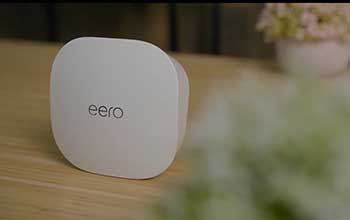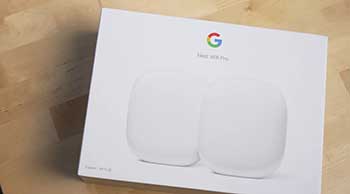Mesh wifi systems like eero 6 and Nest Wifi have become increasingly popular among homeowners looking to eliminate dead zones and get fast, reliable wifi throughout their house. But with so many options on the market, how do you decide which system is right for you?
In this comprehensive guide, we’ll compare eero 6 and Nest Wifi on design, performance, features, setup and app, and value to help you determine the best mesh wifi system for your needs.
A Brief Comparison Table
| Aspects | eero 6 | Nest Wifi |
| WiFi Generation | WiFi 6 | WiFi 5 |
| Frequency Bands | Tri-band (2.4GHz + 2 x 5GHz) | Dual-band (2.4GHz + 5GHz) |
| Speed | Up to 900Mbps | Up to 1200Mbps (router), up to 600Mbps (points) |
| Coverage | 2500 sq ft (router), 1500 sq ft (satellite) | 2200 sq ft (router), 1200 sq ft (point) |
| Design | White, rounded square | White, blue or beige rounded square |
| Mesh Points | Extend network with additional eero 6 satellites | Extend network with Nest wifi points (also function as Google Assistant speakers) |
| Advanced Features | Ad blocking, more customization options | Built-in Google Assistant, easier smart home integration |
| Security | WPA3 encryption, firewall, malware blocking | Standard encryption, firewall and malware protection |
| Parental Controls | Robust with flexible settings | Integrated Google family link controls |
| Ideal For | Large homes, power users, advanced customization | Google smart home ecosystem, simplicity |
Design
Both eero 6 and Nest Wifi feature small, compact router modules that are designed to blend into your home decor.

The second generation eero 6 router has a soft rounded square shape at 4.3 x 4.3 x 1.3 inches. The routers have venting along the sides and bottom and an LED light on top that indicates network status. eero 6 is available in white only.
Nest Wifi routers are a bit larger at 4.7 x 4.7 x 2.7 inches with a clean, minimalist look. They have indicator lights on the front and are offered in snow (white), mist (light blue), and sand (light pink/beige) color options to better match your home’s aesthetic.
For extended coverage, both systems utilize additional satellites or points that are nearly identical to their respective routers inlooks and performance.
eero’s satellites are the same shape and size as the router. Nest Wifi satellites double as smart speakers with built-in mics for Google Assistant and are slightly taller at 4.7 x 4.7 x 3.6 inches.
Overall, both eero and Nest Wifi routers and satellites have compact, unobtrusive designs made to disappear into your decor. Nest Wifi offers more color choices to blend into your home, while eero offers a slightly smaller footprint.
Performance And Coverage
The eero 6 and Nest Wifi both utilize mesh technology to provide seamless coverage throughout your home, but there are some key differences in their specs and capabilities.
Eero 6 is a tri-band system with one 2.4GHz radio and two 5GHz radios in each router and satellite. This allows devices to connect on the optimal band and enables fast speeds up to 900Mbps. It uses the latest WiFi 6 technology for better performance with multiple devices.

Nest Wifi is a dual-band system with 2.4GHz and 5GHz radios in the main router, but only 2.4GHz in the additional points. Speeds top out at 1200 Mbps on the router and 600 Mbps for points. It uses older WiFi 5 technology.
In real-world testing, the eero 6 achieves faster overall speeds at close and long range, especially for multiple connections. However, both provide enough bandwidth for 4K streaming, gaming, and working from home in a typical household.
For range, Nest claims up to 2200 sq ft per router and an additional 1200 sq ft per point. Eero doesn’t list specific coverage areas but performs very similarly. Both systems can be easily expanded and are rated to support 100+ devices.
Eero 6 gives you faster tri-band WiFi 6 support and slightly better performance thanks to its dedicated backhaul radio. But Nest Wifi still provides excellent coverage for most homes.
Also Read: Comparison Between Deco AXE5300 and AXE5400
Features And Capabilities
Mesh wifi systems do more than just provide a reliable signal. Many now offer advanced smart features and customization options. Here’s how eero 6 and Nest Wifi compare.
Smart Home Integration – Nest Wifi doubles as a Google Assistant speaker, allowing you to control smart home devices by voice. Eero has no built-in voice assistant but works with Alexa, Google Home, and Apple HomeKit.
Parental Controls – Both systems have robust parental control options to filter content, pause internet access, and set device time limits. Eero offers more flexibility but Nest has native Google integration.
Ad Blocking – Eero 6 allows network-wide ad blocking through partner services. Nest Wifi does not offer ad blocking features.
Customization – Eero offers more advanced network settings and customization options. Nest Wifi keeps things simple for ease of use.
Security – Both systems have standard security protections like encryption, firewalls, and malware blocking. Eero 6 adds support for WPA3 encryption.
Overall, eero 6 provides more advanced features and customization for tech enthusiasts. But Nest Wifi integrates better into the Google ecosystem.
Setup And App
Mesh systems aim to provide hassle-free setup right out of the box. We’ll see how easy eero 6 and Nest Wifi are to get up and running.
Both systems support mobile setup in about 10-15 minutes by plugging in your main router and satellites and following the app instructions. Eero uses Bluetooth while Nest uses audio tones to sync the nodes.
The eero app (iOS/Android) provides step-by-step guidance during initial setup. It allows you to customize network settings, run speed tests, pause the internet, and more with an intuitive interface.
The Google Home app (iOS/Android) handles setup and management for Nest Wifi. The interface is simple but lacks some of the more advanced controls and info available in the eero app.
Overall, eero and Nest Wifi both make it easy to get your network running with their mobile apps. Eero provides a bit more info and customization in its app, while the Nest app keeps things straightforward.
Value And Price
Mesh systems carry more premium price tags than traditional routers. Let’s see how affordability stacks up between eero 6 and Nest Wifi.
An eero 6 single router retails for $129. A 2-pack with one router and one satellite costs $199, and a 3-pack runs $279. Additional satellites are $119 each.
Nest Wifi sells for $169 for the router, $139 per additional point, and $269 for a router and point 2-pack.
When you factor in the smart speaker built into Nest points, the pricing ends up quite similar between the two options for basic setups. Eero 6 costs a bit less for more advanced multi-point systems.
Both companies offer budget options too – the dual-band eero 6+ at $89 and the Nest Wifi router (no point) at $99.
Overall, eero 6 and Nest Wifi are competitively priced. eero 6 costs less for advanced setups, while Nest Wifi offers better value if you’ll use the Google Assistant integration.
Also watch the video!
Eero 6 Vs. Nest Wifi: Which Is Better For You?
So which mesh wifi system reigns supreme? Here’s a quick recap of the key differences:
- Performance – Eero 6 is faster with WiFi 6 support but Nest Wifi still provides ample speeds for most homes.
- Design – Nest Wifi offers more color options but eero has a smaller footprint.
- Features – Eero 6 has more advanced features and controls. Nest Wifi simplifies with Google integration.
- Setup – Both are easy to set up in 10-15 mins. Eero app shows more info and customization options.
- Value – Cost is similar for basic setups. Eero 6 is more affordable for larger mesh networks.
For the best blend of fast performance, advanced networking features, flexible customization, and competitive pricing, eero 6 gets the edge over Nest Wifi.
But Nest Wifi remains an excellent choice if you want simple app-based setup, built-in Google Assistant, and intuitive controls for a seamless smart home experience.
Either option provides mesh wifi that’s years beyond traditional routers, with easy setup, reliable coverage, and strong security protections.
Make sure to think about your coverage needs, tech skills, and smart home ecosystem before choosing the best mesh wifi for your home.
Also Read: Comparison Between Deco X68 Vs. XE75
Frequently Asked Questions (FAQ)
Overall, yes – eero 6 is the better system for most homes. It provides faster WiFi 6 tri-band speeds, more advanced networking and customization features, and costs less for multi-point mesh setups.
Eero 6 is a better mesh system than Nest Wifi based on performance and features. But Nest Wifi is the best Google mesh option if you want deeper integration with Google Assistant and smart home devices.
Google Wifi is an earlier single-band mesh system. Nest Wifi is Google’s newer dual-band model with WiFi 5 support. Eero Pro and Eero 6 systems offer faster speeds, more features, and better coverage versus Google Wifi.
Eero Pro 6 and Eero 6 systems are among the top-rated mesh routers on the market. Some alternatives with comparable speeds and features include Netgear Orbi, Linksys Velop, and ASUS ZenWiFi AX. But Eero remains a top pick for its ease of use, app, and reliability.
Also Read: Is Eero Better Than Gryphon Wifi System?
Conclusion
- Eero 6 is the faster, more advanced mesh system with WiFi 6 support, robust features and controls, and expansive coverage.
- Nest Wifi is ideal if you prioritize simple setup, Google ecosystem integration, and built-in smart speakers over customization.
- Both provide high-speed, reliable whole-home wifi that’s easy to set up and manage from your phone.
- Choose Eero 6 for performance, flexible controls, and scalable coverage at a reasonable price. Pick Nest Wifi for simplicity, voice integration, and smart home connectivity.
Whichever mesh wifi system you go with, you can enjoy lag-free video calls, gaming, and 4K streaming throughout your household. With a reliable mesh network, spotty connections and dead zones become a thing of the past.
